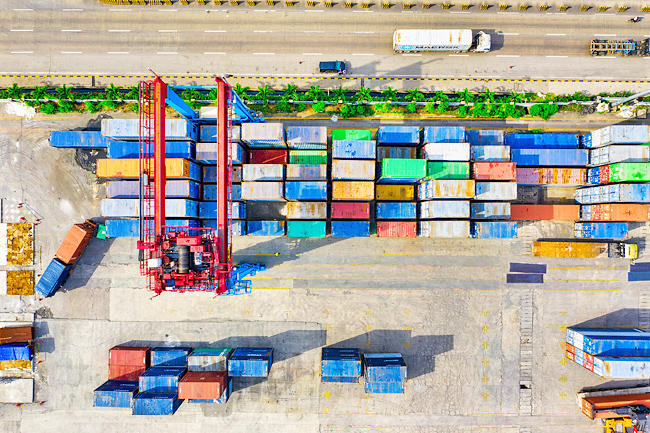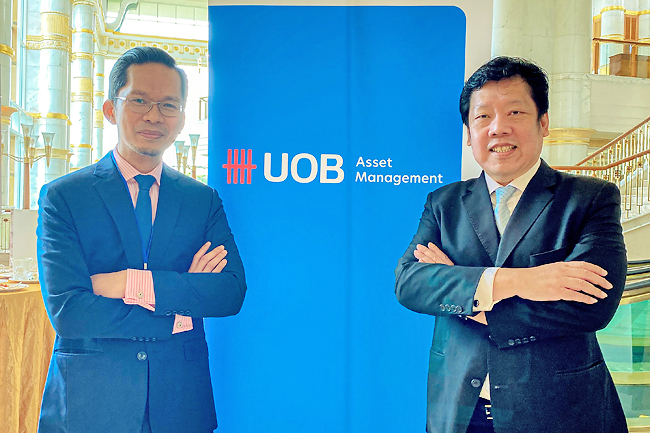Izah Azahari
The COVID-19 pandemic dealt a blow to the equity market last year. This year’s pandemic recovery phase sees an energy crisis for Europe with oil prices substantially higher compared to a year ago. This is due to global developments, especially on the geopolitical front in the wake of the conflict in Ukraine.
Executive Director, Head of Asia Ex-Japan Equities, UOB Asset Management Colin CK Ng shared his views on the impact of the pandemic and on how the investment markets were affected. He was joined by Senior Director and General Manager of UOB Asset Management Kamal Muhammad.
“The world, especially for some developed as well as emerging economies, is currently also facing inflation issues, which has resulted in the United States (US) Federal Reserve trying to stamp out inflationary pressure. And with a higher US interest rate and stronger US dollar, that also brings about certain challenges to the global or even regional economies in Asia,” Colin said.
Colin explained that investors, in general, are looking past the COVID-19 situation, with the exception of China which has in place a zero-COVID policy.
“When you have a zero-COVID policy and stance, whenever there are infection rates, the Chinese government exercises a lockdown which has economic implications,” said Colin, adding that its impact is economic uncertainty.


As markets look past the pandemic, different challenges lie ahead affecting investments.
Most Asian governments and those globally have made the decision to live with the pandemic, and have commenced the re-opening of economies to tourism, travel and businesses.
“ASEAN markets benefitted somewhat this year, performing a lot better in terms of market performance in comparison to the North Asian markets. The point here is that ASEAN markets re-opening means re-opening it to tourism and tourism-related industries, which boost domestic consumption,” Colin said.
As the world is only in phase one of the re-opening, markets are also anxiously looking forward to the Chinese government’s decision to declare the lifting of the zero-COVID policy so that Chinese tourists can also join in and add-on to the existing re-opening of tourism.
Prior to 2020, China accounted for a substantial proportion of tourism.
Colin opined that if the policy is lifted, it will certainly boost domestic tourism spending and domestic consumption, especially for ASEAN economies.
With inflation a key issue due to higher energy and food prices, Colin said Asian Central Banks have to meet the challenges of higher US interest rates, coupled with a stronger US dollar.
“I believe that the Asian Central Banks and corporates also have to exercise a lot of financial resilience in managing their finances so that they do not over-leverage in this environment,” he said.
With some portions of the global economy anticipated to contract over the next nine to 12 months, Colin explained that the global economy is likely to go through a recession, which will also pose a fairly constrained outlook in the near term.
“But it’s an opportunity for some of these Asian companies to basically build out, in terms of capabilities, so that they can prepare and become stronger in the next global economic up-turn.”
Kamal Muhammad touched on the foreseeable challenges with regards to Brunei Darussalam, being inflation.
“It’s a global phenomena all countries are focussing on, especially governments, in terms of how to tackle it – whether through fiscal or monetary policies. It’s not an easy fix and I think Brunei will also continue to see high inflation as is what is happening regionally,” Kamal.
As far as Brunei is concerned, Colin said, “The Sultanate is an Indo-Pacific Economic Framework (IPEF) member. The coming trends are barely visible, so countries and companies should look at what to invest in and what the strong trends are, going forward, such as green renewable energy.
“You need to build a certain supply chain that can help the global supply chain. When we talk about looking at electric vehicles (EVs), you may not have the capital to build EVs, but you can look into the EV battery supply chain and whether you can add value to it,” said Colin.
“The demand for renewable energies such as wind and solar power will certainly get stronger as global economies move away from fossil fuels in the next five to 10 years. It is quite an unstoppable trend,” he said.
Colin added that as we go into the next 10 years, investments in artificial intelligence (AI), digitalisation and robotics development will also be paramount, and that countries are also looking at how to build talent or resources around some of these initiatives that go way into the future.
Kamal explained that some countries, particularly Singapore, place emphasis on green economy and renewable energies. The Lion City also recently announced that it is tapping electrical sources from neighbouring countries as far as Australia.
“That’s certainly a role that Brunei can perhaps play through providing energy sources to countries like Singapore and elsewhere,” he added.
Colin said, the fact is that economies cannot immediately diversify from fossil fuels because they have not made a substantial investment in renewable energy, and over the next 10 years, the world will still be very dependent on oil and natural gases. Therefore, countries that are exporting these energy reserves are still important to the world.
“Brunei is still exporting its oil and it is still a very important factor, but what happens here is that you also have to invest in the future,” said Colin.
Citing Saudi Arabia as an example, Colin said the country is the largest oil exporter in the world, but that it also invests substantially in renewable energy sources. This is its plan for the future generation, aware that oil reserves will not last forever.
Speaking on UOB Asset Management’s future plans in Brunei Darussalam, Kamal said, “We have been in Brunei since 2007, actively contributing to the development of local markets.
We will continue to do so, focussing on helping local investors, whether in retail, corporate or large institutional clients to grow their assets and business.
“That’s our primary goal and we will continue to do that and have more financial products, services and solutions that will help cater to diversifying their investments,” he added.
On green or sustainable investment products, Kamal said, “We will continue to have some of these solutions available in the Sultanate. The Brunei office will step up efforts in developing local talents – be it by education, training or hiring locals – and the recent setup of our sustainability office here will complement regional teams.
“These are the things we are doing in Brunei, we’ll continue to grow that and share our expertise and knowledge with our clients and local industries.”







